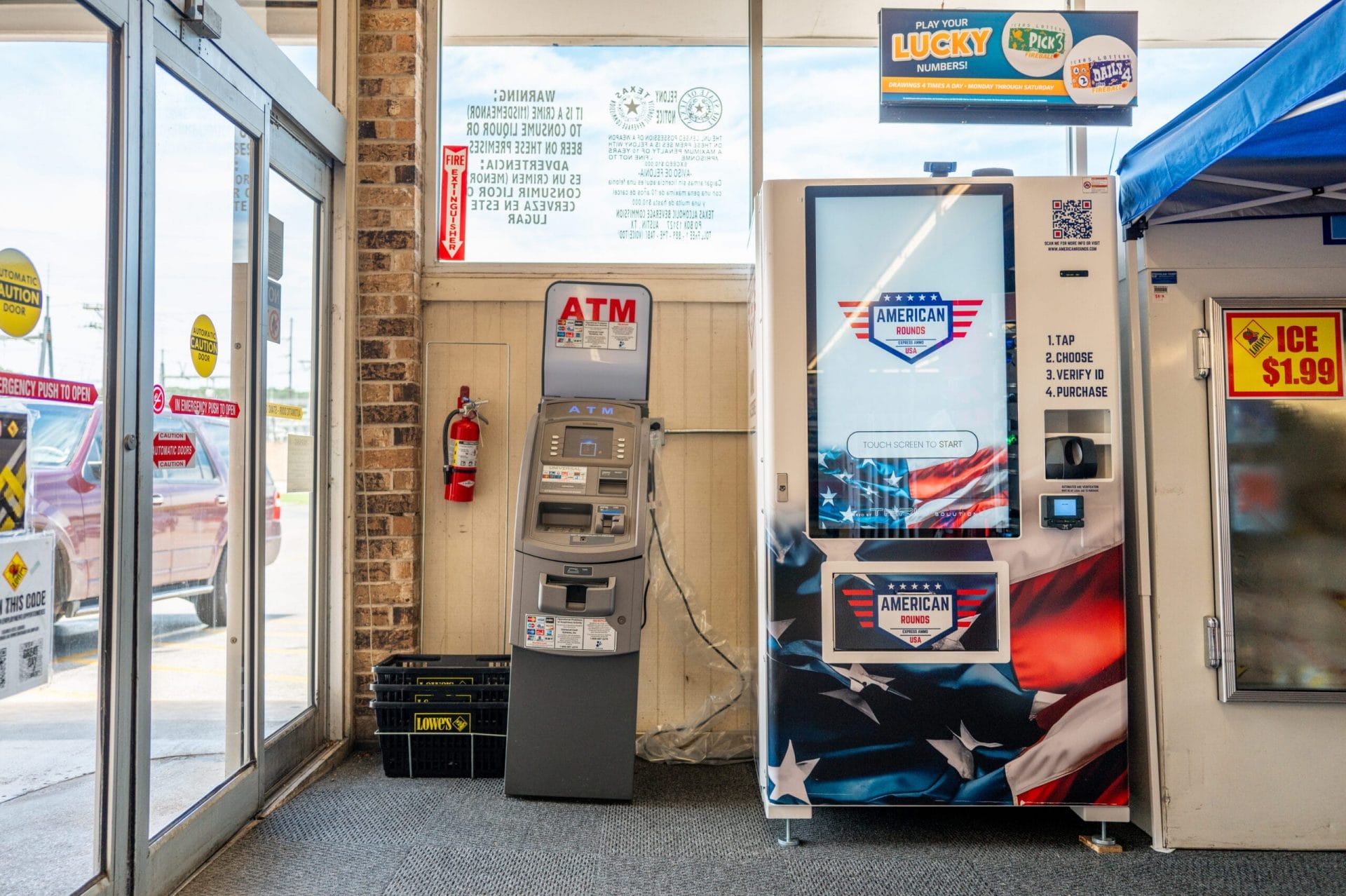
You Shouldn’t Be Able to Get Unlimited Ammo from a Vending Machine
New machines are treating ammunition like candy.
Over the last year, there’s been a troubling trend—ammunition vending machines have started to appear in grocery stores across several states.
There are even plans to open hundreds more throughout the country in the coming months. Described as “automated ammo dispensers,” these vending machines are available to anyone at any time and allow users to select ammunition using a touch screen then walk away with a box of bullets—no background check and no human interaction required.
This type of easy access to ammunition raises significant concerns. Even though ammunition is what renders firearms truly lethal, it is largely unregulated in comparison to guns themselves.
Of course, federal laws that prohibit someone from purchasing a gun, whether due to age, criminal history, or risk of violence, also prohibit that person from purchasing ammunition. But this safeguard is often circumvented, inadvertently or otherwise. That’s because federal law allows retailers to sell ammunition without a license, without running a background check, and without checking a prospective buyer’s identification. This loophole makes it all too easy for dangerous individuals to illegally acquire ammunition.
These machines are shockingly easy to use—and misuse. Purchasers only need to scan their credit card and ID and complete a facial scan before their ammunition is dispensed.
American Rounds, the company that manufactures and distributes these machines, says they have “built-in AI technology, card scanning capability, and facial recognition software” to confirm that the ID presented is valid and that the buyer is the same person represented on the ID card, but the company does not provide specifics on how this is ensured. American Rounds has also stated that plans to distribute hundreds more of these machines are in the works, and that it’s working on fulfilling orders in nearly every state.
The increasing use of ammunition vending machines creates new risks and vulnerabilities when it comes to who can get their hands on ammunition.
Among the biggest dangers posed by isolated vending machines with no human supervision is that they facilitate the straw purchasing of ammunition. When a straw purchase occurs, someone who’s ineligible to purchase ammunition enlists another person to buy the ammunition for them. These automatic ammunition dispensers make straw purchasing incredibly easy—while a human retailer can notice a straw purchase taking place, an automated system will dispense ammunition as soon as an ID scan is completed, even if that ammunition is immediately handed off to the true, unlawful recipient.
Similarly, an automated machine cannot identify when a buyer may be experiencing a mental health emergency or similar crisis, or whether a buyer is intoxicated—situations that would cause a responsible human retailer to decline to perform a sale. This means that individuals in crisis will more easily be able to acquire the ammunition they need to perform acts of gun violence—either upon themselves or others—that would otherwise be easily preventable.
And then there’s the possibility of mechanical interference. A fully digital system can potentially be tampered with, resulting in improper sales. Standalone vending machines, especially those accessible 24 hours a day, are also susceptible to break-in or theft. Without any human oversight, it can be significantly more difficult to prevent or respond quickly to these dangers.
In fairness, some features of these vending machines could, in the right circumstances, represent an improvement to industry practices regarding ammunition sales. In order to use one of these machines, ID verification, which includes an age check, is required. This is something that’s often overlooked or circumvented under current federal law by many retail or online sales—though it’s unlawful for a minor to purchase ammunition, federal law imposes no obligation on sellers to check a buyer’s age.
Ensuring buyers are eligible purchasers is the responsible thing to do, and something these automated ammunition dispensers seem to be successful at—although this practice is heavily undercut by just how easy it is to straw purchase from unmanned vending machines. We’ll never truly solve this country’s gun violence crisis if closing one loophole just opens up another.
GET THE FACTS
Gun violence is a complex problem, and while there’s no one-size-fits-all solution, we must act. Our reports bring you the latest cutting-edge research and analysis about strategies to end our country’s gun violence crisis at every level.
Learn More
Regardless of the security risks or benefits, neighborhood grocery stores are simply not the place for automated ammunition dispensers. It shouldn’t be as easy for anyone to buy an unlimited number of bullets as it is for them to buy a can of soda, and often with less human interaction. Putting ammunition in stores next to “impulse buy” items at checkout like gum, chips, and candy only serves efforts to normalize weapons in public spaces, ultimately making our communities less safe.
Given the age and eligibility restrictions that exist for ammunition sales, and the ease of manipulating vending machines, it makes sense to only keep these machines in areas where they can be directly supervised by a human and where your age must be verified to enter. It’s dangerous to place them in locations where 24-hour access is possible, or where they can be accessed and used without the buyer ever having to interact with an actual person.
The companies that create ammunition vending machines must be subject to reasonable regulation as well (and in the absence of a formal statute, they should commit to responsible business practices). Nobody should be able to walk into a store and purchase an unlimited amount of ammunition for an assault weapon—but right now, anyone with an ID could walk up to one of these machines and buy every bullet it contains.
Nearly two-thirds of Americans agree that lawmakers should limit the amount of ammunition that can be purchased at once. Companies should also have mechanisms in place to limit the amount of ammunition their machines will dispense to a single buyer. This would help to limit the amount of harm that a single shooter can cause, and would also undercut the ability of ammunition traffickers and straw purchasers to engage in illegal purchases.
Beyond this change, lawmakers should implement baseline standards with respect to these machines, including:
- Requiring 24/7 video monitoring of any ammunition vending machines.
- With the assistance of that video monitoring, identifying and reporting the loss, theft, or straw purchasing of ammunition.
- Noting instances of bulk purchases of ammunition.
- Reporting any instances of technical breaches affecting the vending machines themselves that may pose a security risk.
Ultimately, the most effective solution to preventing the unlawful acquisition of ammunition is by requiring a background check for all ammunition sales. But even in the absence of that change, there are still many steps retailers can take to ensure ammunition is sold more safely and responsibly.
The automated ammunition dispensers that are currently featured in grocery stores, with 24-hour access and several security vulnerabilities, fall far short of keeping our communities safe. And as long as these vulnerabilities remain unaddressed, these machines have no place in our communities.
MEDIA REQUESTS
Our experts can speak to the full spectrum of gun violence prevention issues. Have a question? Email us at media@giffords.org.
Contact






